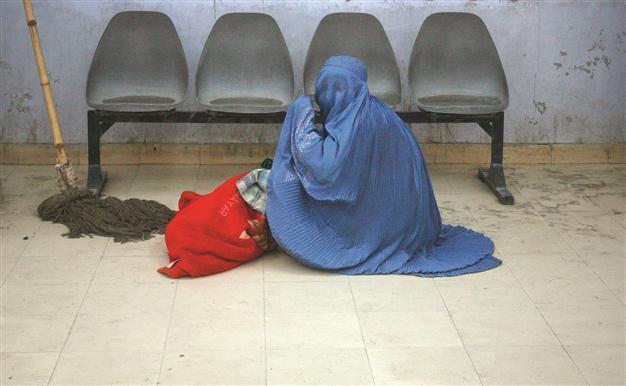Karzai hit hard on women’s bill
KABUL

An Afghan woman sits in a hall way while waiting her turn for a medical checkup at a government hospital in Quetta, Pakistan. Afghan women were not allowed to leave their homes without a male relative as an escort.
Afghan President Hamid Karzai was under fire on International Women’s Day for “selling out” on Afghan women’s rights to try to woo the Taliban into peace talks.Rights organizations, lawmakers and analysts said the Afghan leader by endorsing an edict calling women second-class citizens has endangered hard-won progress in women’s rights since the Taliban fell from power in 2001. The Afghanistan Human Rights and Democracy Organization denounced authorities for trying to strike a balance between receiving foreign aid and “keeping the conservative forces of Afghan society happy.”
“In practice, the demands of extremist elements residing in the presidential palace, particularly those in the judicial bodies as well as the Afghan Ulema council, always outweigh those of the international community,” the human rights group said. On March 2, the Ulema council, Afghanistan’s highest authority, issued a non-binding edict saying women were worth less than men – a statement released by Karzai’s office and then endorsed by the president March 6. “Men are fundamental and women are secondary,” it said, adding women should avoid “mingling with strange men in various social activities such as education, in bazaars, in offices and other aspects of life.”
Shariah reason
Such advice effectively implies that women should not go to university or to work at all. It further stated that “teasing, harassing and beating women” was prohibited “without a sharia-compliant reason,” leaving open the suggestion that in some circumstances, domestic abuse is appropriate.
When the Taliban ruled Afghanistan prior to the 2001, girls were banned from going to school and women had to wear burqas that covered them from head to toe. Women were not allowed to leave their homes without a male relative as an escort.Karzai, who has formally outlawed violence and discrimination against women, caused consternation March 6 by publicly endorsing the statement, saying that it “reiterated Islamic principles and values” in supporting women. Afghanistan’s first deputy speaker, Fawzia Koofi, accused the council of returning women to the dark days of Taliban rule. “This move by the Ulema council drives Afghan women rights towards Talibanization,” she said.
“It could be a message to the Taliban that he could make compromises amending the constitution,” Afghan political analyst Haroun Mir further said. Despite Karzai signing legislation, implementation is poor to non-existent. According to aid group Oxfam, 87 percent of Afghan women say they have suffered from physical, sexual or psychological abuse or been forced into an arranged marriage.
Compiled from AFP and AP stories by the Daily News staff.
















